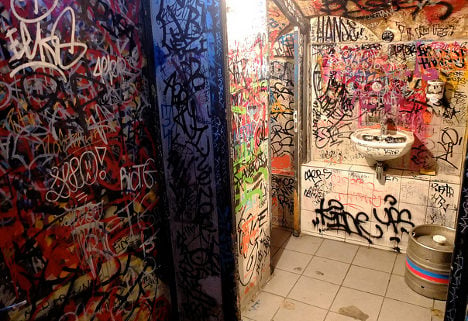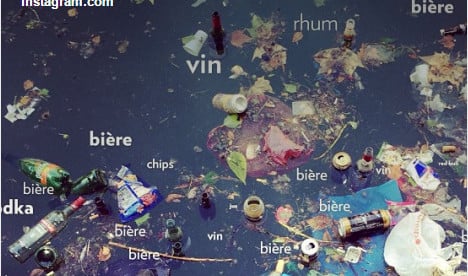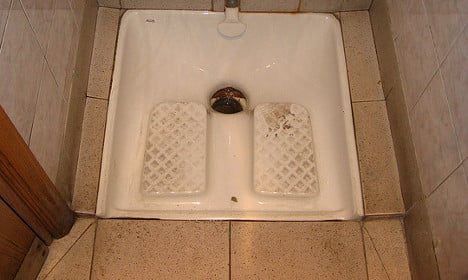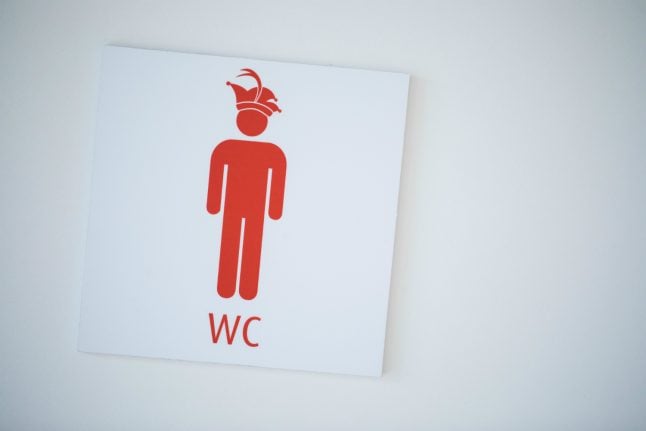France's Ministry of Agriculture has released a map naming and shaming restaurants in Paris that need to clean up their act, and giving gold stars to those toeing the hygiene line. What the map doesn't reveal, however, is the state of these premises' toilets.
Visit any crappy café anywhere in Europe and you won't be too shocked to find the bathroom is a literal and figurative s**t hole – the infamous “toilette à la Turque” is apparently still socially acceptable in the minds of many restaurant owners.
You'd be forgiven for having higher expectations for the WC in the cafés and bars of Europe's chicest city though, especially when you've just paid €25 for a croque monsieur and a Coke in the Saint Germain district.
But don't surprised if things are no different.

(A newly decorated loo in a Paris bar. Photo: Jean-Gilles Arpajou/Flickr)
White tablecloths, red velvet banquettes and waiters who barely deign to take your American Express card are no guarantee there won't be a chamber of horrors lurking behind the door marked “Toilettes”.
These entrances to the seventh circle of hell are found on chic streets such as the Rue Royale and Avenue Montaigne as often as in your rundown neighbourhood PMU cafe-tabac.
One Brit who visited Paris recently told me: “When you go into a toilet in a café or brasserie in Paris, you just never know what you are going to get.”
Although one thing café toilets do tend to have in common is a lack of space – somewhat counter-intuitively, in many there is barely enough room to go to the loo.
Even the poshest of places often opt to turn the cupboard under the stairs into the toilet so as not to lose a square inch of profitable space into which another table could be shoehorned.
In the popular La Marine on the banks of the Canal Saint Martin, the queue for the one loo stretches out into the dining area, meaning you are left eating your boeuf-bourgignon surrounded by people crossing their legs and dancing around on the spot.
SEE ALSO: Paris's bohemian canal- more tip than hip

Last weekend I ate brunch at what was plainly a hot spot pour les hipsters deep in the haut Marais – there were breakfast burritos, babies in skinny jeans and world-weary American music industry execs doing their best to feign the blasé manner of the surrounding Parisians. All very Buzzfeed list come to life.
Until I opened the door to the bathroom and was plunged into the depths. Literally. Half the floor was missing. There was no discernible way to flush the toilet, in which multiple flies were having their own Sunday catch-up session – apparently the American author of a painstaking blog post I found on how to flush French toilets hasn't visited yet.
At one hip bar alongside the canal in northeastern Paris, a trip to the toilet requires crossing a courtyard, often in the dark, with mice scampering at your heels, to reach a Dickensian outhouse so small there's no room to take your trousers down.
And one well-known St Paul pub has a toilet you have to sit on sideways if you're taller than the average 10-year-old.
At another café in the fashionable Marais, tourists can be witnessed coming in to ask if they can use the restroom, and then walking straight back out again upon seeing it. Those who ventured in had to hold their breath while crouching to get into a loo that wouldn't have been out of place in Tolkien's Hobbit village.
Baby changing facilities and disabled access are an impossible dream in most places, where those who've eaten a particularly large lunch may find themselves struggling to negotiate the invariably tiny spiral staircase to the bowels of hell (pun intended), never mind those with actual mobility issues.
On the plus side, if you do make it down you may well make some new friends – even the most prim and proper of eateries will have toilets so cosy and convivial as to be basically unisex, with open urinals for men right by the (usually solitary) cubicle for women.
It can get a bit awkward if there's a queue. Perhaps that's why so many (men, at least) pee in the street.
Unabashedly holding aesthetics in the highest regard may be the local industry, but when it comes to the café loos the city's achingly beautiful veneer is really only rez-de-chaussée-deep.
It may all be part and parcel of the Paris experience, but if you are a stickler for a posh toilet, we can recommend the facilities at the Carrousel du Louvre shopping centre, where for the bargain price of €1.50 you get Dyson dryers, Top 40 pop music piped in and a “hand-cleaned” stall, equipped with Beyoncé's favourite toilet paper.
Available to take home for just €9.90 a pack, it comes in hot pink, lime green, turquoise and yellow – although apparently Bey favours red.
By Pipi le Pew



.jpg)
 Please whitelist us to continue reading.
Please whitelist us to continue reading.
Member comments